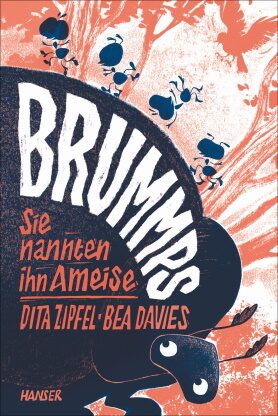Dita ZipfelBea Davies
Brummps. Sie nannten ihn Ameise
[Brummps. They Said He Was an Ant]
- Carl Hanser Verlag
- Munich 2022
- ISBN 978-3-446-27255-2
- 136 Pages
- Publisher’s contact details
Published in Italian with a grant from Litrix.de.
Sample translations
Springboard to Happiness
The protagonist is one Danny Dung-Beetle. He lives in an ant colony and everyone - himself included - regards him as a giant ant. However, he is unlike the other ants: he can't see or smell very well and is too big and ungainly, so is treated as an outsider. His female friend Butz is the only one who stands by him when he’s being bullied yet again. When Danny is one day diagnosed with an infectious disease because he is increasingly stricken by a deep inner shaking and buzzing (a case of the “Brummps”), he decides to leave the ant colony in order to protect everyone else. Wise Butz goes with him.
“Treat every problem as a potential springboard to happiness” - this is Butz’s motto. And she’s right: Danny’s apparent weaknesses as an “ant” turn out in retrospect to be just “strengths to be revealed”. On his search for a new home, Danny finally discovers that his “Brummps” are connected with his wings and with flying - and with his true identity as a dung beetle. He saves Butz from serious danger and discovers real love.
There are already countless children’s stories worldwide concerning the perennial themes of outsiders, bullying and friendships, all with an age-appropriate happy ending. Dita Zipfel’s “Brummps”, however, is a very special book which stands out from the crowd for a variety of reasons. For one thing, its intimate portrayal of nature is enchanting without ever tipping over into kitsch. Then there’s its gentle unironic humour which remains on the same limited level as the ants. Above all, there’s the delightful and sensitive word play. When Danny describes himself as a “failure on six legs” or a “scrabbling weirdo” it is amusing yet simultaneously sad. One can’t help imagining that it’s a child seeing him or herself as a “walking failure”.
Moreover, “Brummps” presents translators with a fantastic challenge. Neologisms, word plays, snappy soundbites: imagination and creativity are most definitely called for, along with an ear for comedy and sparky ripostes, a delight in absurd couplings and quirky concepts. Fortunately, no translation is necessary of Bea Davies’ illustrations, which are an integral part of the story. The joyous energy of this instinctive style of illustration and the blazing black/white/orange design concept make their own immense contribution to this very special book.
The narrator is - surprisingly - Nature herself. She mediates between the bug and the readers, and comments on Danny’s feelings and experiences so subtly and powerfully that we completely forget that the story is “just” about a fat, scrabbling creature. She draws no firm conclusions, but digresses, ironises and reflects on what is happening - thereby revealing the poetry of the story almost as if in passing.
Dita Zipfel’s “Brummps” is a wonderfully bonkers yet highly authentic children’s story. It’s a delightful read, and demonstrates a profound understanding of living creatures who don’t conform to the expectations of their environment. We all know people of whom this is true - outsiders or people who are unwell, for instance. If one absolutely had to find (a mini-ant-sized) fault with this fast-paced book, one might argue that it’s slightly too complex for six-year-olds. But this is what the book has in common with Danny Dung-Beetle himself: its weakness is in fact its great strength.
Translated by Helena Kirkby

By Sylvia Schwab
Sylvia Schwab is a radio journalist with a special interest in literature for children and teenagers. She serves on the jury for the monthly ‘Best 7’ list of books for young readers produced under the aegis of Deutschlandfunk and Focus, and works for Hessischer Rundfunk, Deutschlandfunk and Deutschlandradio-Kultur.
Publisher's Summary
Jonny Ant isn’t like other ants. However much he tries, the others are always better: they can carry more, smell and see better than him, and always fit through the tunnels in their anthill. When Jonny’s suspiciously large body starts to tremble and he is diagnosed with the contagious Broommps, he decides he’s had enough. Together with his friend Butz - the only ant in the world who doesn’t like to work - he runs away. Together they get caught up in an adventure in which Jonny’s weaknesses increasingly turn out to be strengths. Because thanks to Broommps, some things are suddenly possible that he would never have dreamt of…
(Text: Carl Hanser Verlag)
